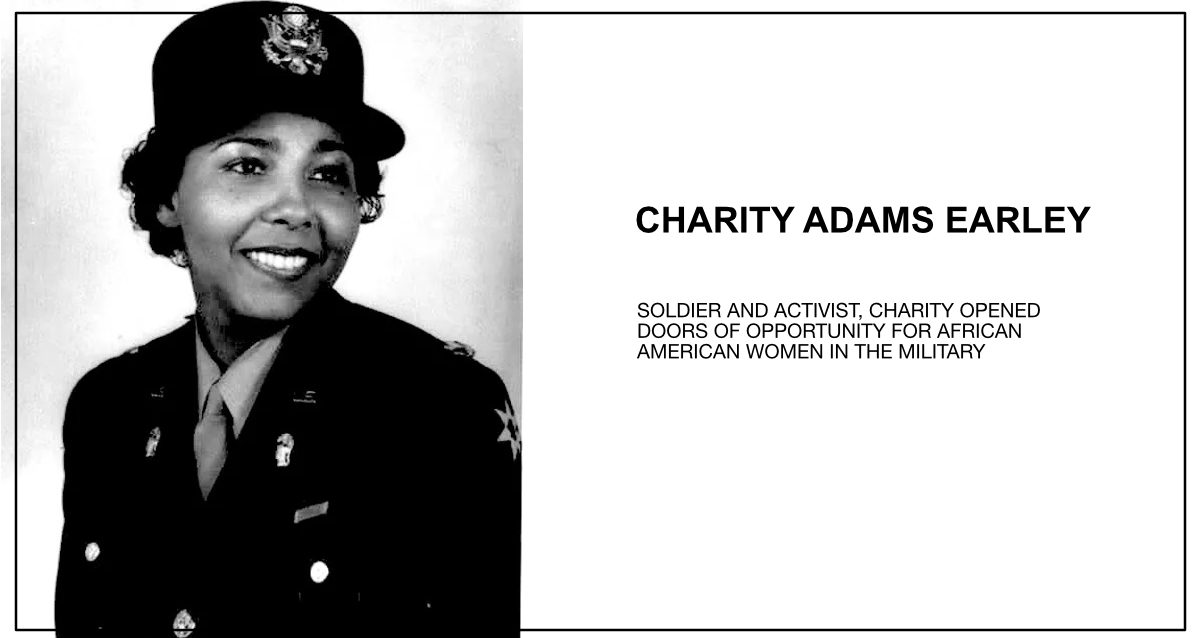Charity Adams was born in 1918 in NC at a time when there were few opportunities for Black children; however, from the time that she was a small child, it was evident that she was gifted academically. She was tested at a young age and began school in the second grade in Columbia, S.C. After graduating from high school as the valedictorian, she received a scholarship to Wilberforce University, one of the top Black universities at that time.
Following graduation from college, Charity taught middle school math and science for four years while attending graduate school. In 1942, she decided to join the Women’s Army Corps (WAC) since there were few opportunities for Black women in the south at that time. After working as a training officer and a company commander at Fort Des Moines, she was promoted to major in 1943.
Charity fought against discrimination in the military on two fronts: one because of her gender and the other because of her race. However, she advanced rapidly in the military ranks, sometimes fighting against the prejudice of people above her. First, she lobbied the Pentagon to let Black women serve overseas and became the first commanding officer of the first unit of Black women to serve overseas in World War II. As commander of the 6888th Central Postal Directory Battalion, she and the women under her were first deployed to Birmingham, England, to sort and deliver a backlog of mail that filled an airplane hangar. They came up with the slogan, “No Mail, Low Morale.”
A general threatened to assign a white officer to show Charity how to lead the unit. She replied “Over my dead body, sir.” He threatened to court-martial her for that reply, and she started to file charges against him for using language emphasizing racial segregation. Charges were dropped by both of them, and the general later came to respect Charity.
The battalion was given six months to finish the job, but Charity came up with a plan to finish faster. She used special locator cards and serial numbers to find the soldiers. Then she divided the workload into 3 eight-hour shifts. By working seven days a week, the women finished the job in three months. While in Birmingham, Charity also fought against segregated living and recreational facilities. She told Red Cross officials that her women would not use the segregated facilities.
Following Birmingham, the battalion was sent to Rouen, France, and then to Paris to deliver mail that had set in hangars for two to three years. Again, they finished the job in three months. The unit handled about 65,000 pieces of mail a day.
At the end of 1945, Charity was promoted to lieutenant colonel. It was the highest rank available for women in the WAC. In March 1946, Charity asked to be relieved from active duty and received an honorable discharge from the army. Later, she worked for the VA as a registration officer during 1946 and 1947 where she reviewed veterans’ applications for educational funds and benefits under the G.I. Bill and decided how much money each veteran would get.
After working in academic administration, Charity married Stanley Early, Jr., in 1949 and moved to Zurich, Switzerland, where her husband was attending medical school. She attended courses at the University of Zurich and studied analytical psychology. After returning to the U.S. in the 1950s, she served on a number of boards and was active in the community. One of her most important accomplishments was establishing the Black Leadership Development Program in Dayton, Ohio, in 1982. It is now known as Parity, Inc., and trains and educates Black students to be leaders in their communities.
In 1996, the Smithsonian National Postal Museum honored Earley for her work as commander of the 6888th Central Postal Directory Battalion. The Smithsonian named her as one of the 110 most important historical Black women.
Washington, Beth A. “No Mail, Low Morale,” Army University Press
National Museum of the U.S. Army
https://www.womenshistory.org
en.m.wikipedia.org

